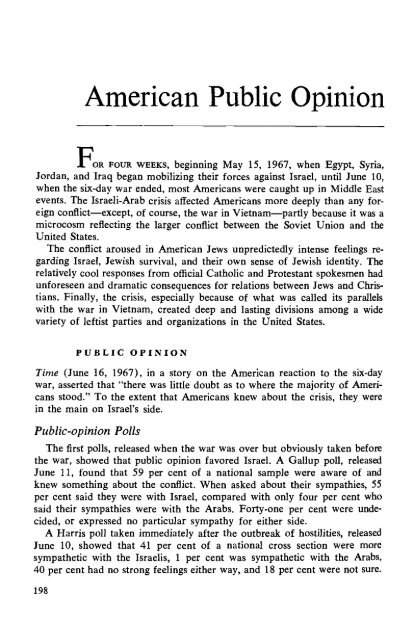1968_4_arabisraelwar
Create successful ePaper yourself
Turn your PDF publications into a flip-book with our unique Google optimized e-Paper software.
American Public Opinion<br />
A OR FOUR WEEKS, beginning May 15, 1967, when Egypt, Syria,<br />
Jordan, and Iraq began mobilizing their forces against Israel, until June 10,<br />
when the six-day war ended, most Americans were caught up in Middle East<br />
events. The Israeli-Arab crisis affected Americans more deeply than any foreign<br />
conflict—except, of course, the war in Vietnam—partly because it was a<br />
microcosm reflecting the larger conflict between the Soviet Union and the<br />
United States.<br />
The conflict aroused in American Jews unpredictedly intense feelings regarding<br />
Israel, Jewish survival, and their own sense of Jewish identity. The<br />
relatively cool responses from official Catholic and Protestant spokesmen had<br />
unforeseen and dramatic consequences for relations between Jews and Christians.<br />
Finally, the crisis, especially because of what was called its parallels<br />
with the war in Vietnam, created deep and lasting divisions among a wide<br />
variety of leftist parties and organizations in the United States.<br />
PUBLIC OPINION<br />
Time (June 16, 1967), in a story on the American reaction to the six-day<br />
war, asserted that "there was little doubt as to where the majority of Americans<br />
stood." To the extent that Americans knew about the crisis, they were<br />
in the main on Israel's side.<br />
Public-opinion Polls<br />
The first polls, released when the war was over but obviously taken before<br />
the war, showed that public opinion favored Israel. A Gallup poll, released<br />
June 11, found that 59 per cent of a national sample were aware of and<br />
knew something about the conflict. When asked about their sympathies, 55<br />
per cent said they were with Israel, compared with only four per cent who<br />
said their sympathies were with the Arabs. Forty-one per cent were undecided,<br />
or expressed no particular sympathy for either side.<br />
A Harris poll taken immediately after the outbreak of hostilities, released<br />
June 10, showed that 41 per cent of a national cross section were more<br />
sympathetic with the Israelis, 1 per cent was sympathetic with the Arabs,<br />
40 per cent had no strong feelings either way, and 18 per cent were not sure.<br />
198


